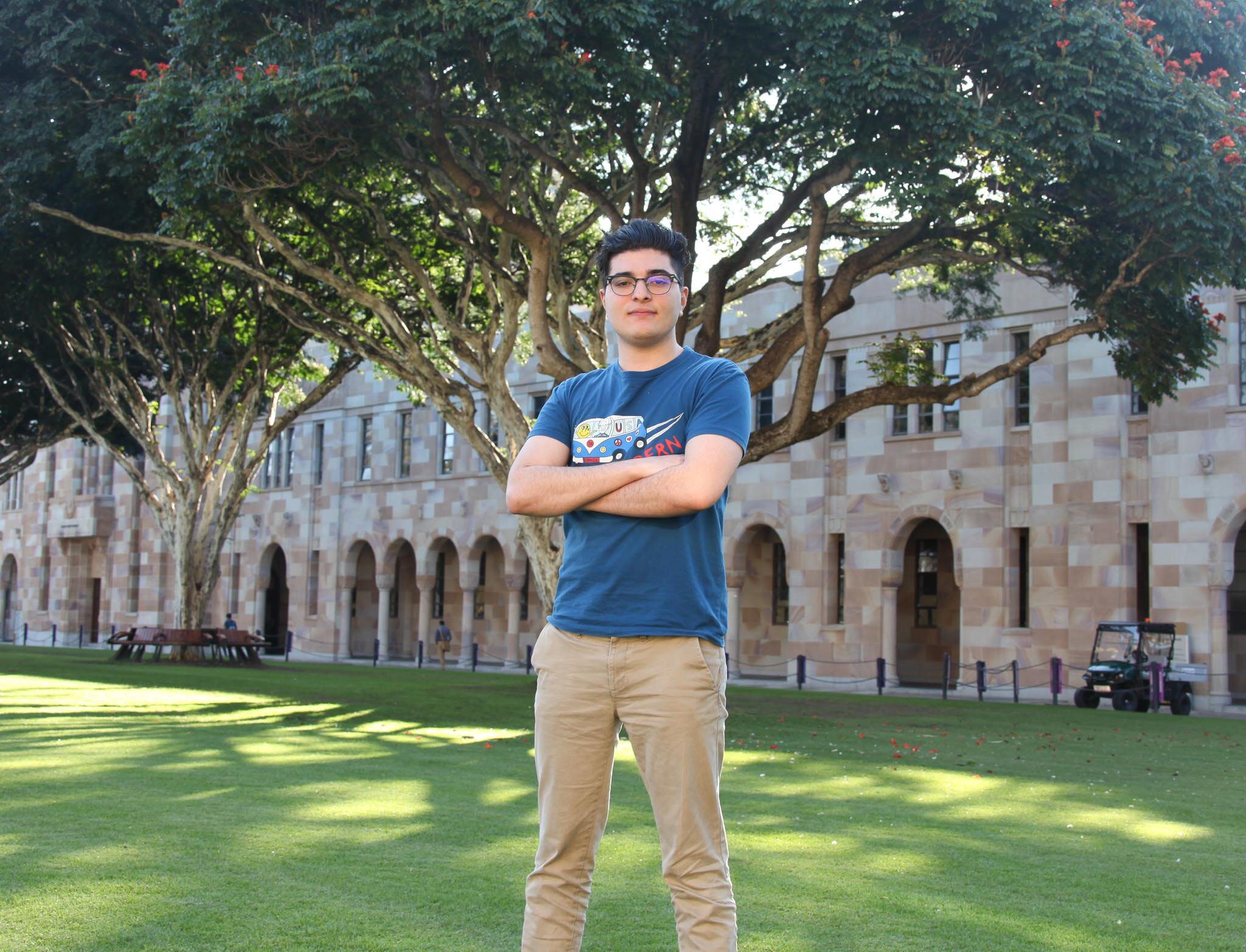Explosive internal documents reveal the University of Queensland ran a forensic, behind-the-scenes intelligence gathering campaign against whistleblower Drew Pavlou, including creating extensive dossiers of the then 20-year-old’s social media activity. UQ generated 15,700-plus pages of documents regarding Pavlou in just 11 weeks earlier this year, including over 13,770 pages of “legal advice”. We have exclusively obtained the freedom of information files. Anthony Klan reports.
Appreciate our quality journalism? Please donate here
EXCLUSIVE
The in-house “investigation” into whistleblowing University of Queensland student Drew Pavlou – which saw him banned from campus and handed a two-year suspension – was formally escalated almost immediately after university management learned he had taken photos of himself outside its Chinese Government-funded Confucius Institute.
The Klaxon has exclusively obtained a cache of internal UQ documents which reveal the extraordinary lengths the university has gone to in its campaign against the 21-year-old student, whose condemnation of Beijing’s influence peddling on Australian university campuses has drawn the international spotlight and sparked a federal government inquiry.
The documents, released under freedom of information laws, reveal the university ran a sophisticated and forensic intelligence gathering campaign against Pavlou, including creating extensive secret dossiers about the then 20-year-old student’s social media activities.
Remarkably, the searches also reveal that between just March 16 and June 4 the university generated 13,770 pages of legal advice in its campaign to oust the philosophy and political science major, who was democratically elected to the powerful UQ Senate by his fellow undergraduate students in October last year.
Under its former vice-chancellor of seven years Peter Hoj, who had close ties to Beijing, UQ became highly dependent on money from China.
(In May it was revealed Hoj, who stood down in late-July in a pre-announced move, had been paid a $200,000 bonus in 2019, partly based on his success deepening the University’s ties to China.)
The university’s actions regarding Pavlou, and the associated concerns over Chinese interference, have made headlines across the globe, including in The New York Times, The Washington Post, The Wall Street Journal and the UK’s BBC, among many others.
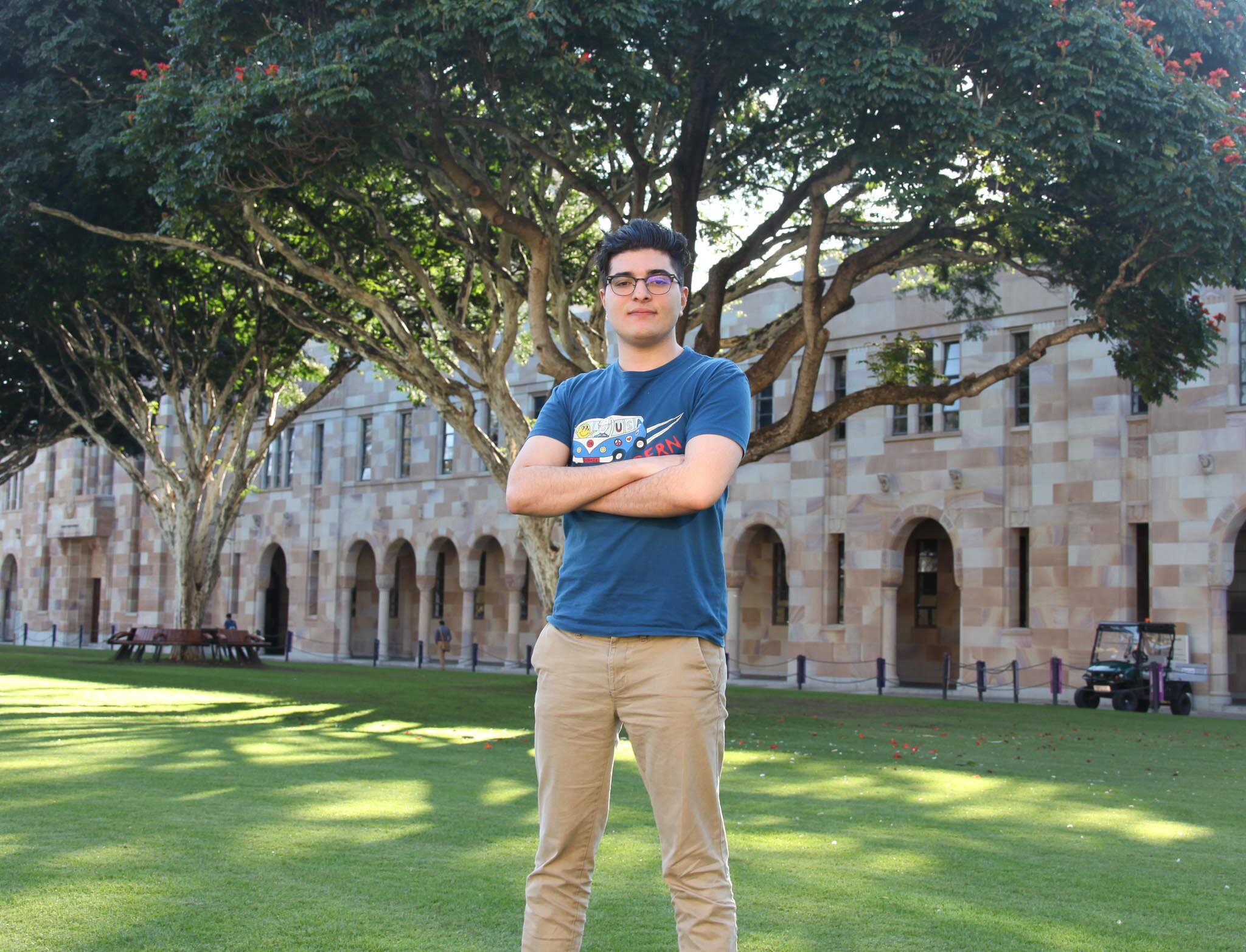
Defiant: Drew Pavlou in the Great Court, UQ’s St Lucia campus. Picture: Anthony Klan
Facing widespread criticism over its actions against Pavlou, UQ has repeatedly made public comments suggesting its actions were unrelated to Pavlou highlighting concerns about the Chinese Government.
However it can now be exclusively revealed that UQ management ramped up a formal investigation into Pavlou – which saw him suspended from the university, banned from setting foot on campus, and removed from his democratically elected position on the powerful UQ Senate – immediately after learning he had “posted images of himself outside the Confucius Institute”.
Confucius Institutes are funded by the Chinese Government and claim to be simply “Chinese language and cultural centres”.
However the institutes are generally extremely closely tied to the Chinese Government and are widely viewed as being “soft power” tools and propaganda institutions for the Beijing regime, whose political interference operations in Australia have escalated rapidly in recent years.
Sweden has banned the institutes, the US has designated them a foreign propaganda mission, while the Australian Federal Government has launched an investigation into the institutes on Australian campuses, including the Confucius Institute at the University of Sydney.
Hoj had been a “consultant” to the Confucius Institute Network from 2013, a year after he became UQ vice-chancellor, to late 2018.
In December 2015 at a ceremony in Shanghai, Chinese Vice-Premier Liu Yandong presented Hoj with a “prestigious award” – called the “Outstanding Individual of the Year Award” – in “recognition of his contribution to the global Confucius Institute Network”.
The Chinese Vice-Premier also chairs the Confucius Institute headquarters, also known as Hanban, which “is responsible for about 470 Confucius Institutes” around the world.
In October last year the ABC revealed the Chinese Government had co-funded “at least four” UQ courses, via the campus Confucius Institute, including one on human rights and “mass atrocities prevention”.
From 2013 Hoj had been a senior consultant to Hanban, and in 2017 became a member of its powerful Governing Council of Confucius Institute Headquarters, the ABC reported.
Hoj stood down in late 2018 after receiving legal advice that if he didn’t he would be forced to register on Australia’s new Foreign Interference Transparency Scheme.
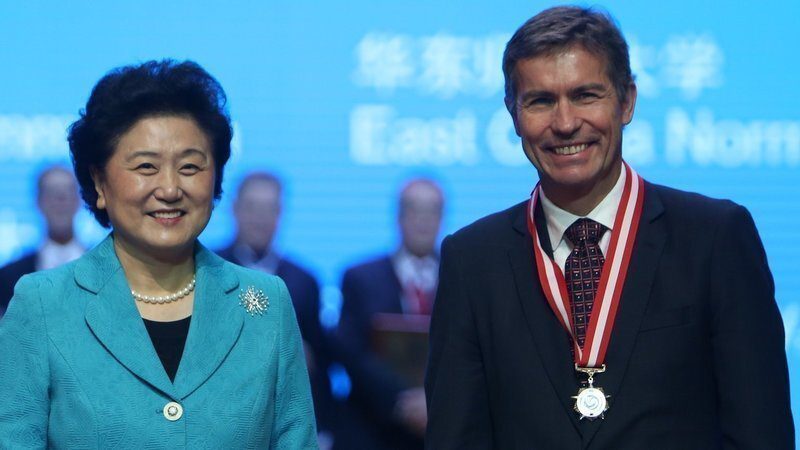
Long-time UQ vice-chancellor Peter Hoj receives an award from the Vice-Premier of China, Liu Yandong. Source: Supplied
Dossiers
The UQ document cache reveals that on 7.46am, on Monday March 16, university management shared an extensive dossier documenting, via 19 screen shots, Pavlou’s social media activities over the preceding three days.
Included in the dossier, which spans 22 pages, was a photo of Pavlou standing outside the Confucius Institute, which had been taken three days earlier and posted to social media by Pavlou the day before.
The notes accompanying the dossier made seven points about Pavlou’s social media activities over the three day period, one of those points pertained to the Confucius Institute photograph.
At 10.06am on the same day, UQ management shared a second Pavlou dossier.
This dossier was solely concerned with Pavlou and the Confucius Institute.
It included the same shot of Pavlou outside the Confucius Institute, along with screenshots of comments made on social media in response to the photograph.
“There is (an online) discussion happening about Drew’s Stunt at the Confucius Institute,” the note accompanying the second dossier states.
“Examples of the comments include below:”
The internal UQ documents reveal that just 32 minutes later – at 10.38am – UQ’s Academic Registrar, on official letterhead, granted a senior staffer special powers to take “misconduct” action against Pavlou.
The email stated it was “in relation to allegations of possible misconduct involving a student, Drew Pavlou”.
Weeks later UQ handed Pavlou a massive, 186-page, document alleging 11 cases of “serious misconduct” against him, which, despite the vast majority being rejected by the university’s own disciplinary process, culminated in him being suspended from the university, and so automatically removed from the UQ Senate.
Among the misconduct allegations against Pavlou were that he had used a pen at a university store to write a note, and then replaced the pen without buying it.
Pavlou was handed a two year suspension by the university disciplinary board.
On appeal, again to a UQ disciplinary board, all but two of the allegations were thrown out.
Regardless, he was suspended for one semester, the current university semester, which meant he was removed from the UQ Senate for the remainder of his one-year tenure.
Before being suspended from UQ and booted from its senate, after highlighting concerns about the Chinese Government, Pavlou, who was born and raise in Brisbane, had been a star student.
In October last year he was elected, in an overwhelming victory, to be the undergraduate representative on the UQ Senate.
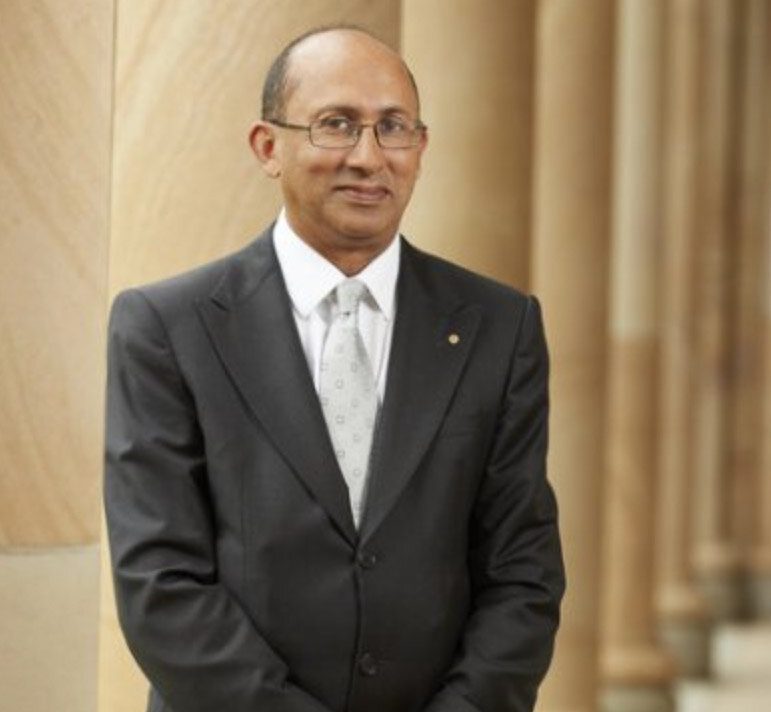
UQ chancellor Peter Varghese. Source: UQ
The UQ Senate is similar to the board of a major company, except it is even more powerful because the vice-chancellor (identified as the “chief executive officer” in UQ’s governing legislation) is also a member of the senate, along with several other members of UQ management.
The cache of internal UQ documents were released after Tony Morris QC formally applied for them under freedom of information laws.
Morris, a prominent Queensland barrister and free speech advocate, is representing Pavlou on an unpaid, pro-bono basis.
He says UQ’s allegations of misconduct are a front for the university’s true aim of appeasing China, by silencing Pavlou, who he says is being subjected to serious injustice.
Pavlou tells The Klaxon he was profoundly disturbed when he saw the content of the documents Morris had obtained under the right to information laws.
“When I first opened the dossier and saw those compilations of my social media posts, I was absolutely terrified,” Pavlou says.
“They had everything on me, they had been going back through years of social media posts, I knew the campaign they were launching against me was massively resourced, and I just thought my life was over.
“I got in my car and drove off to some dark car park far from my home so no one would see me cry and I just spent hours and hours on the phone to UQ,” he says.
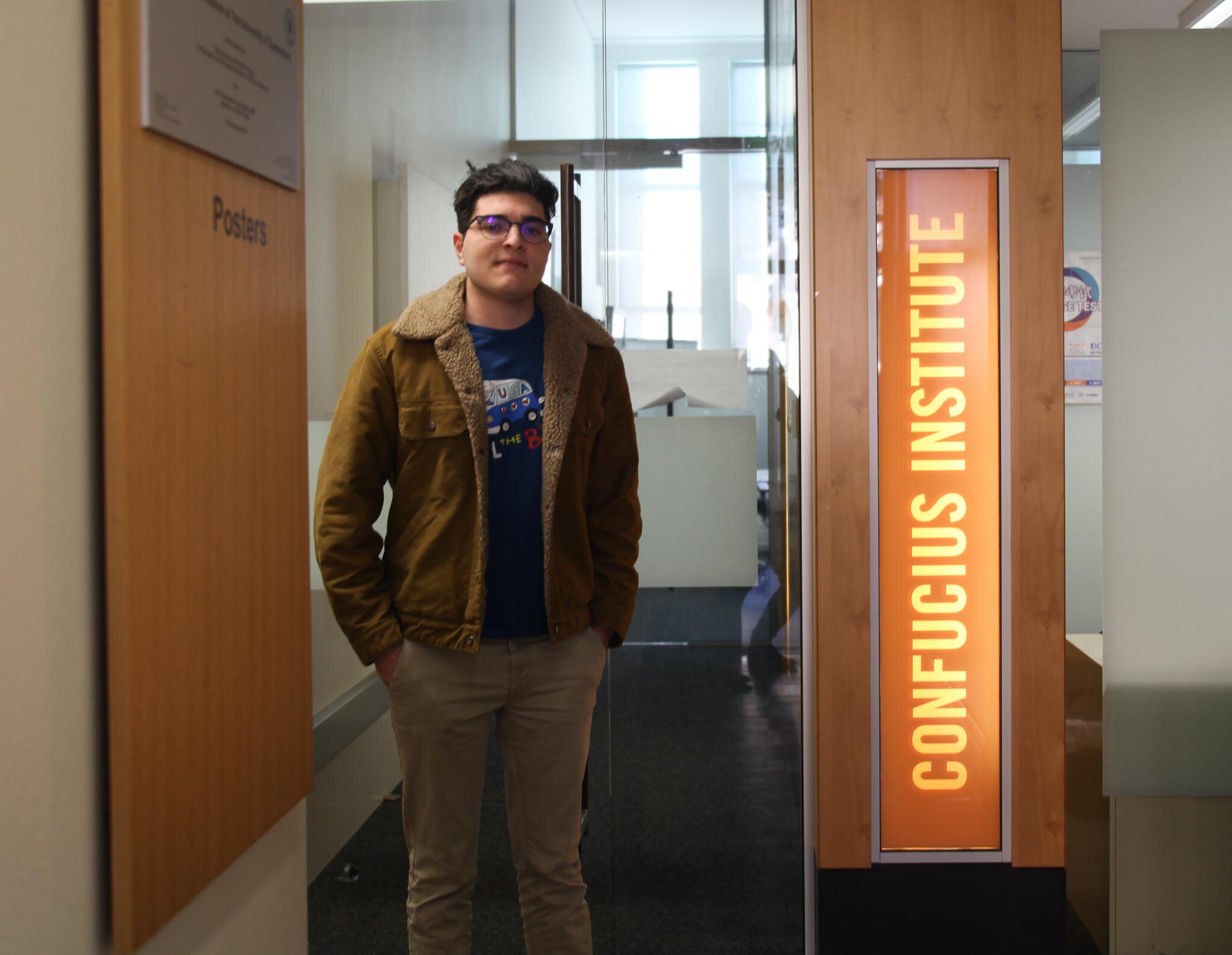
Drew Pavlou visits UQ’s Confucius Institute with The Klaxon. Picture: Anthony Klan
Top brass silent
Neither UQ chancellor Peter Varghese nor Professor Deborah Terry, who replaced Hoj as UQ vice-chancellor in August would comment when repeatedly approached by The Klaxon.
In a written statement, UQ communications manager Kim Lyell said the UQ Academic Registrar email was “unrelated to the incident” of Pavlou posting a photo to social media of himself outside the Confucius Institute, which had been circulated among management immediately beforehand.
“The email you refer to on 16 March from (Academic Registrar Mark) Erickson was an internal procedural formality, and unrelated to the incident,” Lyell said.
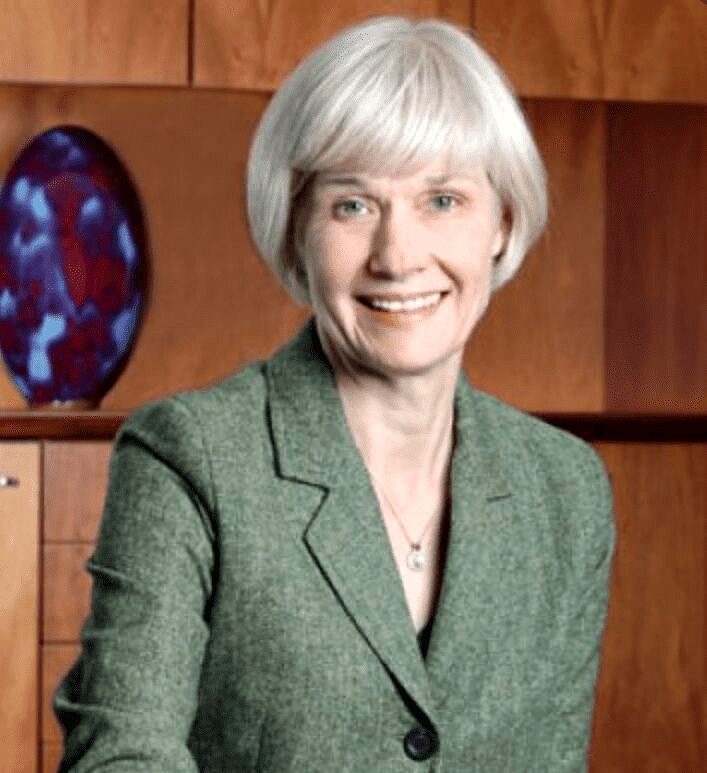
Professor Deborah Terry, appointed UQ vice-chancellor in August. Source: UQ
“Investigations into allegations of misconduct were not triggered by the incident you mention.”
We asked Lyell for confirmation from chancellor Varghese and deputy chancellor Terry that those statements were correct.
We received no response.
Lyell said Academic Registrar Mark Erickson’s email address had not been among those email addresses to which the two dossiers had been sent on the morning of March 16.
When asked to confirm whether Erickson had been aware of the existence or contents of those dossiers before he wrote formally to escalate UQ’s actions against Pavlou, Lyell declined to comment.
Requests for comment from Erickson were also refused.
Pavlou sees the internal documents as proof his subsequent suspension from UQ – and removal from the UQ senate – was a result of his actions highlighting impropriety by the Chinese Government, including its Confucius Institutes.
15,791 pages
On June 4, Tony Morris QC applied for certain documents relating to its actions against Pavlou, under Queensland’s Information Privacy Act.
Morris sought internal UQ documents for a range of time periods (for example one related to just March 16 – April 6, a three-week period) but all fell between March 16 and June 4 this year, a total period of about 11 weeks.
In that time, and just relating to the Pavlou information sought by Morris, UQ produced 15,791 pages of documents.
Of those, UQ denied access entirely to 13,803 pages, released 1,778 pages in full and 234 of them were redacted to varying degrees.
Of the 13,803 pages UQ denied access to, 13,770 (99.8%) were denied on the basis they comprised “requests for legal advice from the University administration to either a University lawyer or an external lawyer, and responses to those requests”.
Legal experts said the university’s actions against Pavlou, which have included engaging barristers and partners of multiple top-tier law firms, have likely already cost the taxpayer-funded institution millions of dollars.
Last year alone, UQ received over $760 million from Australian taxpayers.
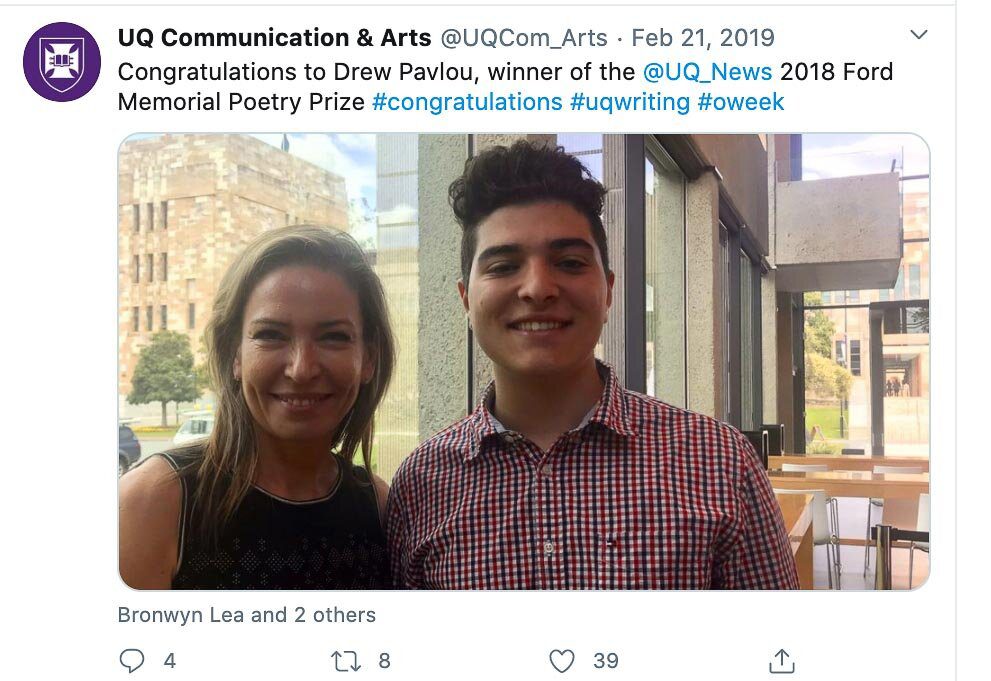
Happier times: UQ awards Pavlou the Ford Memorial Poetry Prize in 2018 – before he began highlighting his concerns over Chinese Government interference. Source: Twitter
Landslide
Pavlou, a star UQ student who has twice been named a Dean’s Scholar by the university for his academic achievements, has never received a mark below a distinction for any of his courses, and was awarded the annual UQ Ford Memorial Prize for best poem submitted by an undergraduate, was elected as the UQ Senate’s undergraduate student representative on October 11 2019.
UQ’s governing legislation, Queensland Government’s University of Queensland Act 1998, states that among its members, the UQ Senate must include both an undergraduate and a post graduate UQ student, who are elected to those positions by their fellow students.
The vast power held by the UQ Senate, and the stipulation that its members must include two current UQ students is written into government legislation, highlights the importance of those positions.
Pavlou was elected in a landslide.
“I beat campaigns financed and supported by the Labor Party with an insurgent campaign conducted online with zero resources,” Pavlou tells The Klaxon.
“It was the highest turnout election in UQ history and I ultimately won in a landslide by 2,000 votes.”
Pavlou had a high profile on campus. (In May this year he was dubbed “the most famous undergraduate in the world”).
The otherwise little-known undergraduate student was cast into the national spotlight after being physically assaulted at a pro-democracy demonstration.
Pavlou organised the protest at UQ’s St Lucia campus, in Brisbane’s inner-west, on July 24 last year to show solidarity for those suffering in Hong Kong (More on this under Background, below).
In his senate position, Pavlou worked to highlight Beijing interferences on Australian university campuses, including its alleged network of influence within members of UQ’s senior management, as well as other matters he saw of concern, and of concerns to other undergraduate students he represented.
Coronavirus
On Friday, March 13, Pavlou demonstrated against the university’s failure to shut down amid the Coronavirus, which he saw as putting students in danger.
Pavlou donned a hazmat suit and placed a sign outside the office of vice-chancellor Peter Hoj, and, on his way home, posed for a photograph outside the Confucius Institute.
(His campaigning appears to have been successful: on Sunday March 15 UQ announced that, from the next day, lectures and tutorials would: “be conducted in online mode ONLY, in response to campus COVID-19 spread concern”.)
When he got home on the Friday, Pavlou posted a picture of himself in the hazmat suit outside Hoj’s office.
On the Sunday he posted the photo of himself outside the Confucius Institute, which he said he had walked past only as an “afterthought” with the focus of his Friday protest being Hoj’s office.
Along side the picture he wrote: “As a student representative, it’s my job to keep students safe – that’s why I’ve placed the UQ Confucius Institute under a total and complete lockdown until biohazard risk contained!”
The following morning UQ management was provided with the two dossiers of Pavlou’s social media activity over the previous three days.
The dossiers of Pavlou’s social media activity, sent at 7.46am and 10.06am on March 16, had been sent to six members of UQ management, as well as the university’s entire media team.
Both dossiers were emailed to “UQ Communications [communications@uq.edu.au]” which is the general mailbox for media queries.
Searches show UQ, which has been among those universities laying off highly experienced lecturers and other academic staff due to “cost cutting”, has a “Marketing and Communication” team comprised of a remarkable 92 people.
Alongside the email address “communications@uq.edu.au” on UQ’s Marketing and Communication “contact” page are 8 names, including that of spokeswoman Kim Lyell.
A further four people are listed under the heading “directorship” on the Marketing and Communication contact page, including Kelly Robinson, UQ’s “Chief Marketing and Communication Officer”.
That is alongside the 80 other “media and communication” people listed.
Correspondence from chief marketing officer Robinson (who sits above Lyell in the chain of command) appears prominently in the cache of documents The Klaxon has received regarding UQ’s behind-the-scenes actions involving Pavlou.
Lyell said there were eight people within the UQ communication team with access to the email account communications@uq.edu.au.
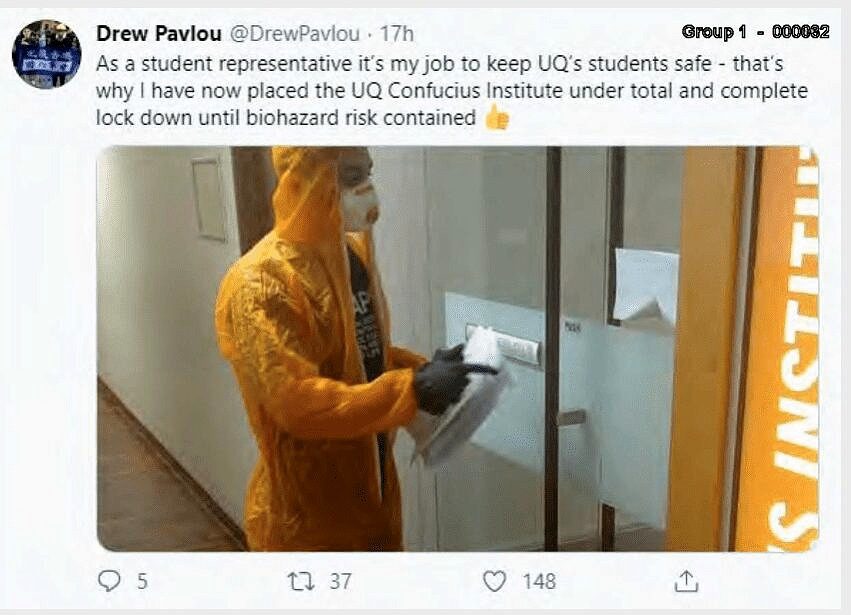
Sunday, March 15. Pavlou Twitter post. Source: UQ
Confucius Institute
The name of the author of the two Pavlou dossier’s sent on March 16 has been redacted from the documents, however the emails’ context makes it clear the author is working for the university and is gathering information about Pavlou at the university’s behest.
The first email is titled “social update” and it makes seven points about Pavlou’s social media activities over the preceding three days (between Friday March 13 and Sunday March 15).
Five of the seven points relate to Pavlou’s calls for the university to suspend classes due to Coronavirus, and begins: “Good morning everyone, Drew has been posting on Twitter and on Facebook about UQ closing over the weekend”.
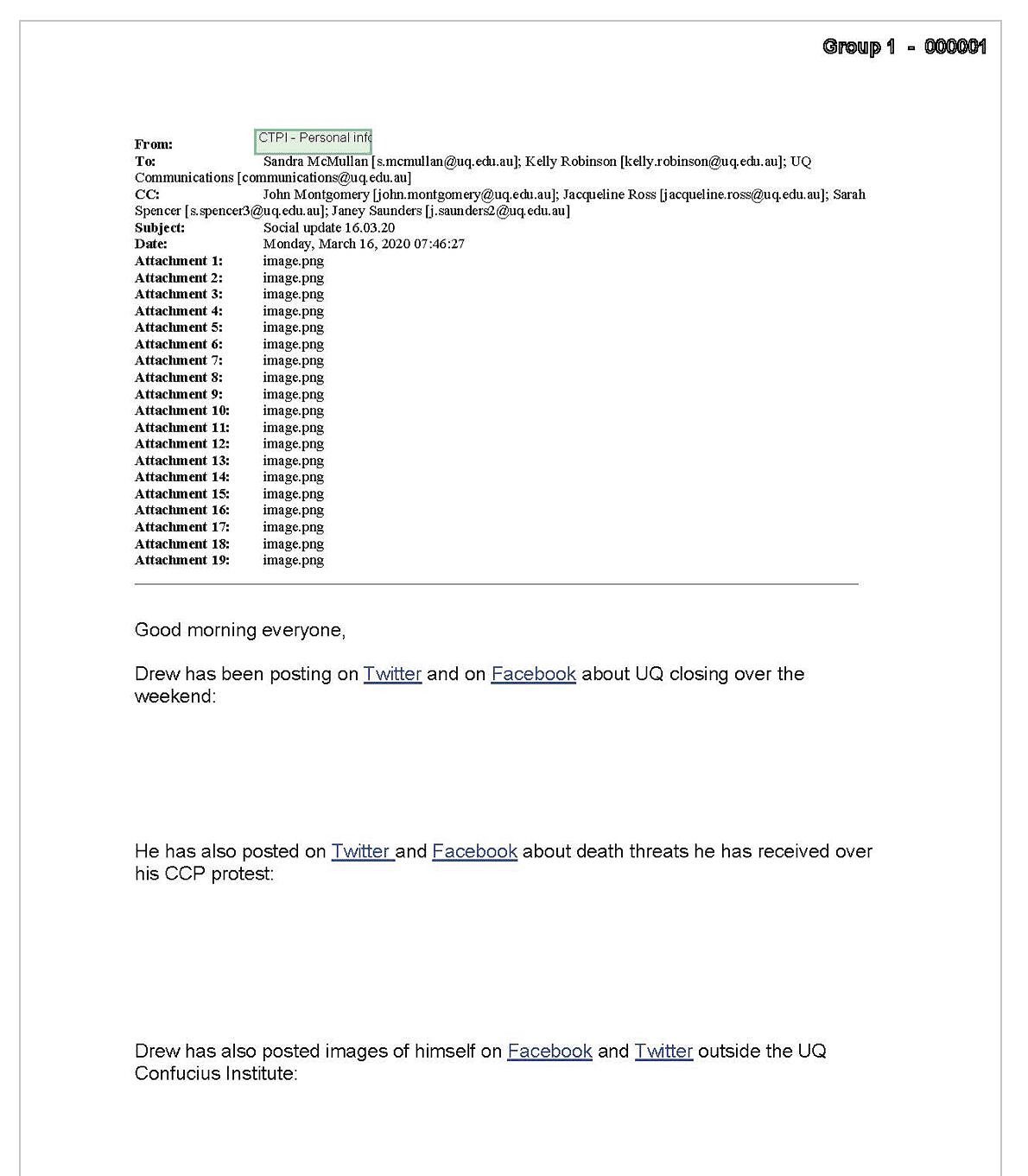
The first page of Pavlou dossier one, Monday March 16, 7.46am. Source: UQ
One of the seven points is regarding the Confucius Institute: “Drew has also posted images of himself on Facebook and Twitter outside the UQ Confucius Institute”, it says.
Just over two hours later, at 10.06am on the Monday morning, the second dossier is distributed among UQ management.
The second dossier is entirely about Drew being photographed outside the Confucius Institute.
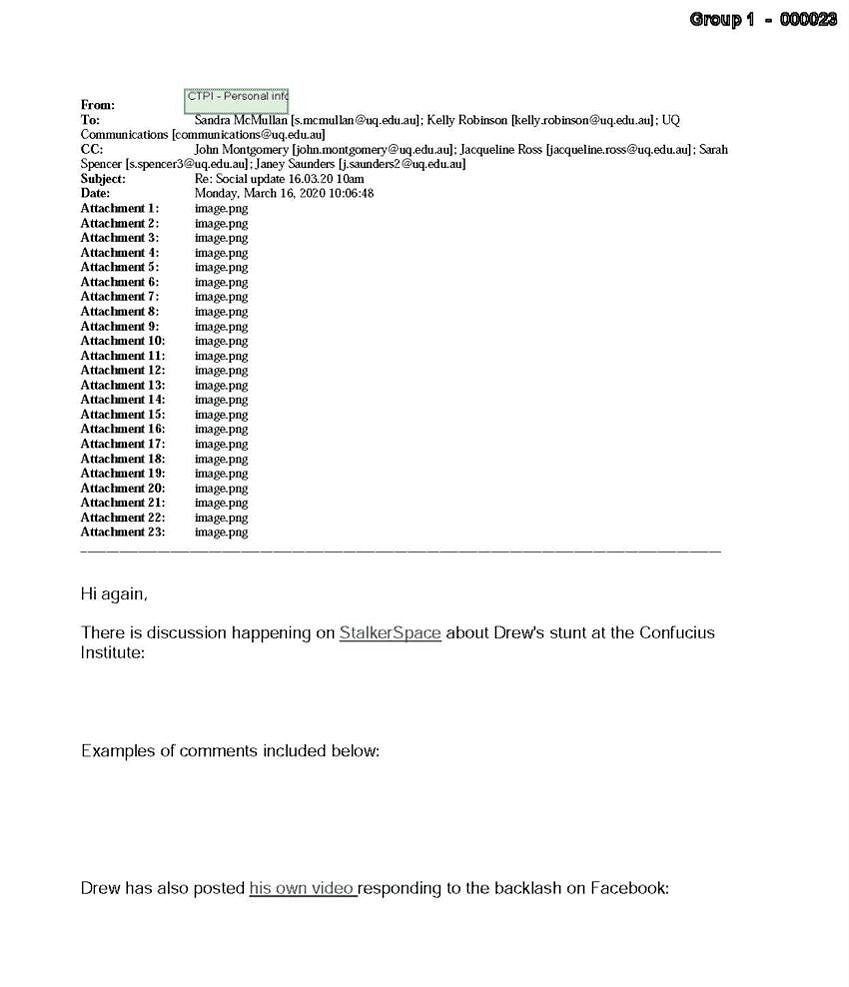
Pavlou dossier two, Monday March 16, 10.06am. Source: UQ
“Hi again, there is discussion happening on (social media) about Drew’s stunt at the Confucius Institute,” the second dossier states.
“Examples of comments included below:” it states.
“Drew has also posted his own video responding to the backlash”.
Just 32 minutes later, at 10.38am, the Academic Registrar, on official letterhead, sent an email “in relation to allegations of possible misconduct involving a student, Drew Pavlou”.
The letter is from UQ director of academic services Mark Erickson to deputy director of academic services Helen Morahan.
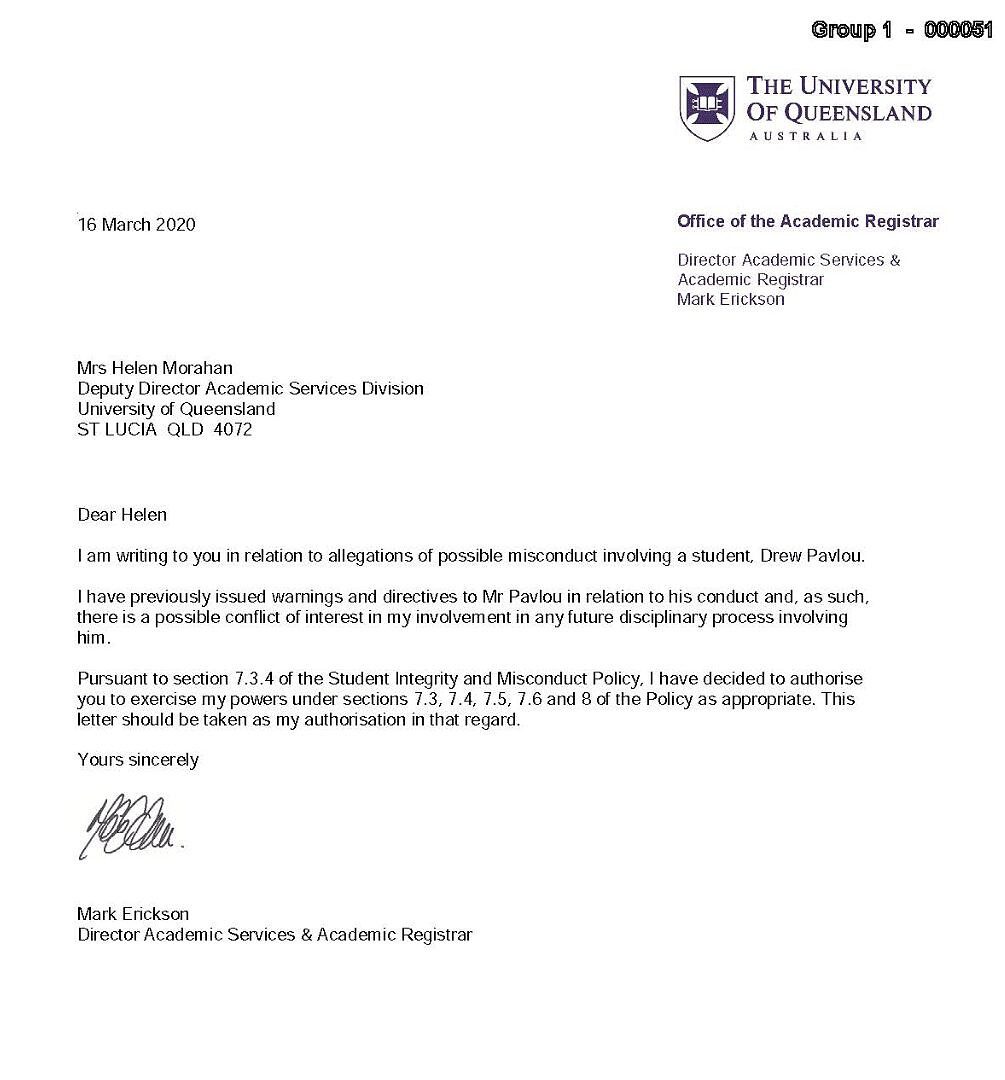
Letter from Mark Erickson to Helen Morahan regarding Pavlou, emailed at 10.38am, Monday March 16. Erickson cites “conflict of interest”. Source: UQ
“I have previously issued warnings and directives to Mr Pavlou in relation to his conduct and, as such, there is a possible conflict of interest in my involvement in any future disciplinary process involving him,” Erickson writes.
He then authorises Morahan to use his powers to take “misconduct” action against Pavlou.
“Pursuant to section 7.3.4 of the Student Integrity and Misconduct Policy, I have decided to authorise you to exercise my powers under sections 7.3, 7.4, 7.5, 7.6 and 8 of the Policy as appropriate,” Erickson writes.
“This letter should be taken as my authorisation in that regard.”
Erickson’s name does not appear in the list of emails that the two dossiers sent on the morning of March 16, shortly before he wrote to his colleague regarding “misconduct” allegedly involving Pavlou.
“Mr Erickson did not receive the information on the Confucius Institute you refer to,” Lyell wrote in response to The Klaxon’s questions.
When we asked for a statement from Erickson as to whether or not Erickson “was aware of Mr Pavlou’s interactions involving the Confucius Institute when he sent the email in question”, Lyell declined to provide one.
“We are not in a position to respond on some of your requests due to the Supreme Court action brought by the student against the University,” Lyell responded.
It was unclear why UQ was “able” to make statements suggesting Erickson had not known of the Pavlou Confucius Institute dossiers – but simultaneously “not in a position to respond” when asked specifically whether Erickson had in fact been aware of Pavlou’s Confucius Institute interaction before he ramped-up the Pavlou investigation.
Despite Erickson’s March 16 letter to deputy director of academic services Helen Morahan apparently being, in part, to relieve Erickson of an alleged conflict of interest regarding Pavlou, Erickson’s name appears repeatedly in subsequent internal UQ correspondence regarding Pavlou.
For example, on April 20, Erickson writes in an “urgent” email: “Sorry to do this but can you draft a brief letter to D Pavlou this morning about the upcoming Hearing for me to review”.
Erickson is also the author, or recipient, of two heavily redacted emails dated March 30 and titled “Student grievance against Drew Pavlou”.
On April 1 Erickson sends an email, also redacted, titled “DP Complaints”.
There are many more examples.
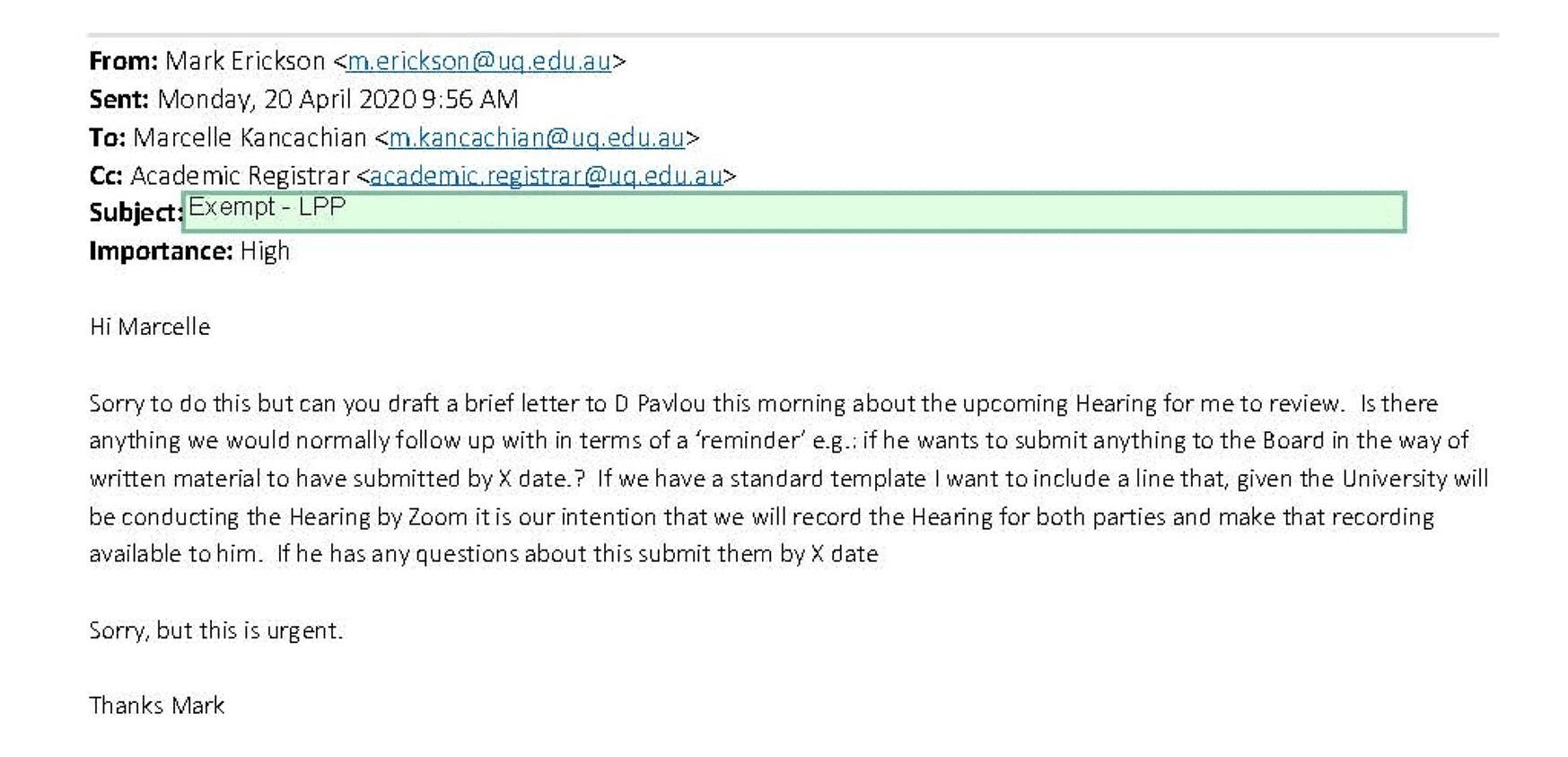
Mark Erickson closely involved in action against Pavlou, despite weeks earlier “recusing” himself. Source: UQ
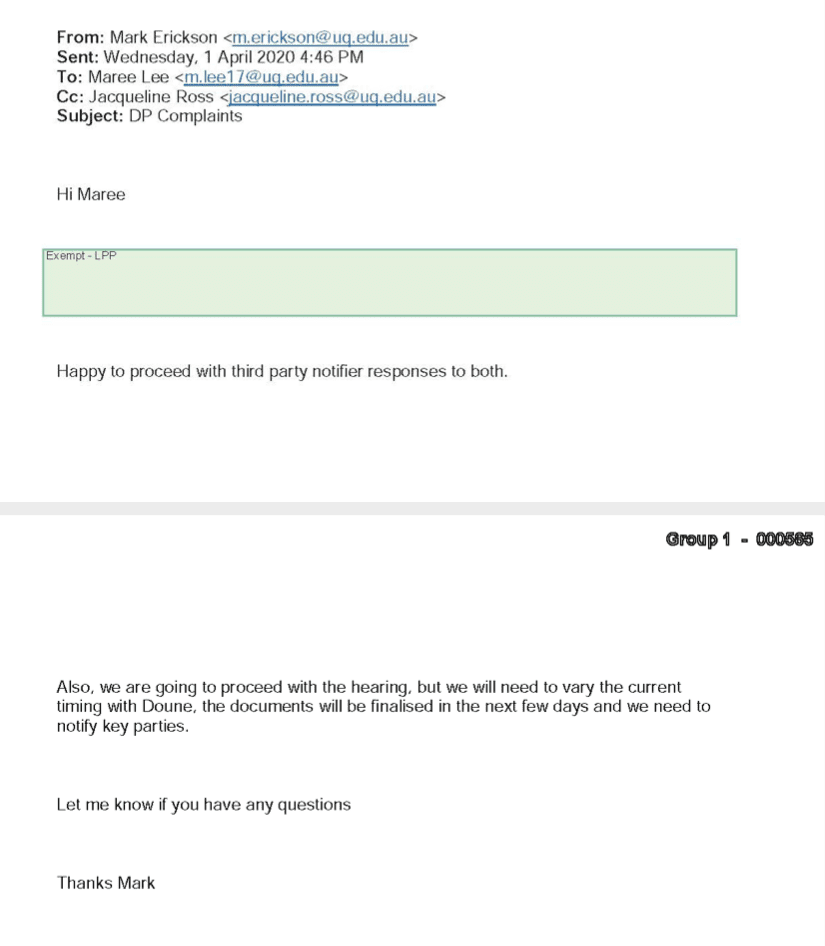
Another email showing Mark Erickson dealing with “misconduct” actions against Pavlou, despite earlier allegedly recusing himself. Source: UQ
History repeats
UQ is no stranger to serious controversy.
Vice Chancellor Hoj, who cast UQ into one of the biggest controversy’s in its 110-year history, was appointed to the position in October 2012 in a bid by the University Senate to repair an earlier scandal.
Vice Chancellor Professor Paul Greenfield was outed from the job after it emerged in the media in November 2011 that he had pushed for his daughter to be admitted into UQ’s medical school, despite her failing the entry requirements.
Greenfield’s daughter was subsequently admitted, leapfrogging 343 better-qualified students.
An investigation by Queensland’s Crime and Misconduct Commission (now called the Crime and Corruption Commission) slammed UQ management’s handling of the scandal.
It found UQ guilty of “downplaying the seriousness of the matter” in its public statements; that it had not been dealt with the matter transparently; had hidden the true reason for Greenfield being stood down, and that the university had made misleading public statements, having claimed to have conducted an internal investigation into the matter and implied there had been no finding of misconduct against Greenfield.
“It’s certainly the case that the CMC does not believe this matter has been dealt with the transparency that it would expect,” the CMC report said.
UQ responded at the time, in a written statement, saying it had “learned from the events”.
“The University has noted and taken on board the conclusion of the CMC that it demonstrated a lack of transparency in its public statements and in its statements to its own staff,” the statement from the university said.
Background
It was the first demonstration Pavlou had ever organised.
The July 24, 2019 demonstration had been a peaceful “sit down”, until a group of pro-Chinese Communist Party thugs began attacking people, chanting pro-communist slogans, yelling abuse and tearing up pro-democracy flyers.
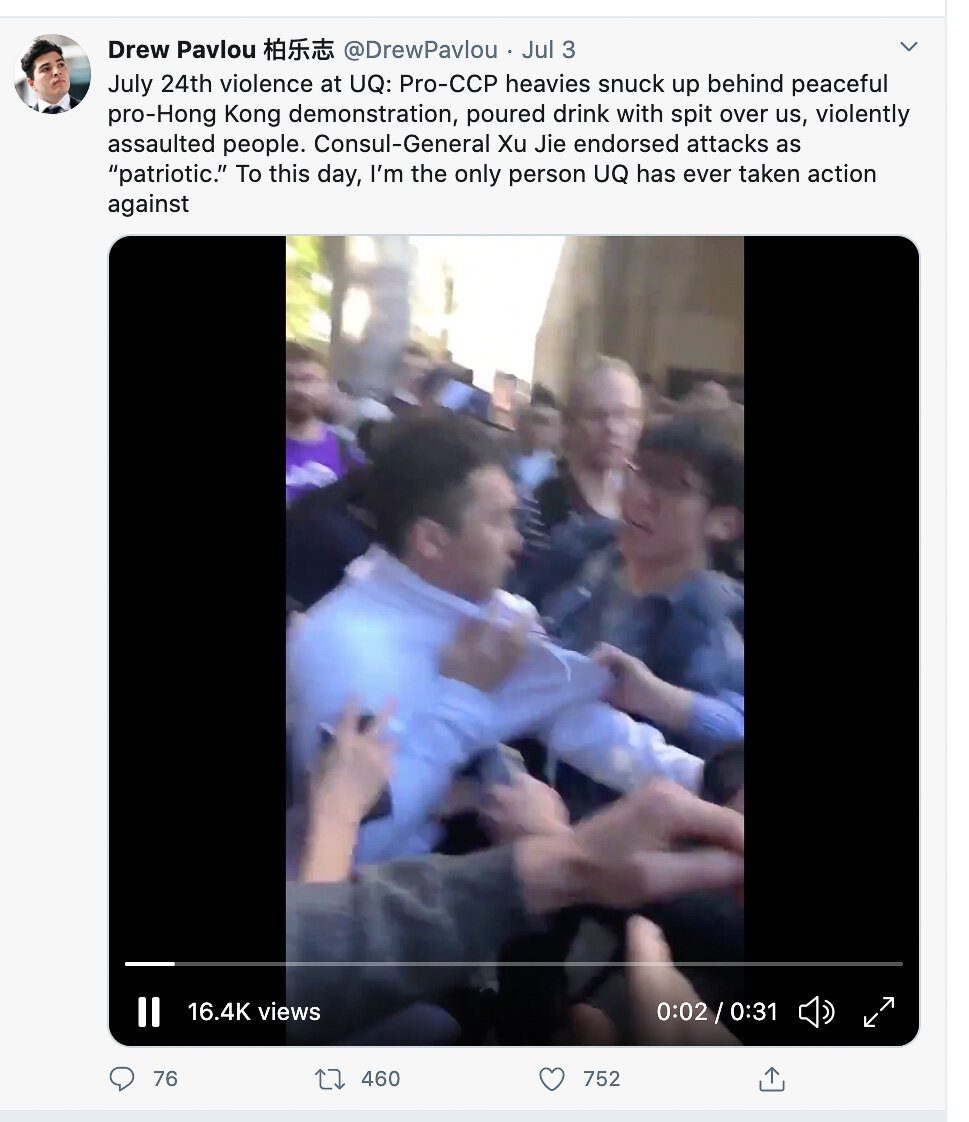
Drew Pavlou posts to Twitter about the July 24, 2019 attacks one year later. Source: Twitter
One of the men walked up and snatched a megaphone from a sitting Pavlou, and punched him.
In all Pavlou was allegedly assaulted by three men wearing masks who punched him in the head and the ribs, and tore up a placard he had been holding.
None of the men who set on the demonstration have been identified, despite a university “investigation”.
Pavlou and others believe the men, many of which appeared to be in their 30s and were not known to be students, were acting at the behest of the Chinese Consulate in Brisbane.
The day after the protest the Chinese Consulate-General in Brisbane published a statement on its official website praising “patriotic students for counter-protests against separatists”.
Chinese Communist Party-owned publication The Global Times named Pavlou, who it labelled an “Australian national”, as one of the organisers of the demonstration.
Two days after the protest, Foreign Affairs Minster Marise Payne issued a warning to foreign diplomatic representatives located in Australia, saying the Australian Government would not tolerate interference in the exercise of free speech.
The Government “would be particularly concerned” if any foreign diplomatic mission were to encourage “disruptive or potentially violent behaviour”, Payne said.
In November last year Pavlou and lawyer Mark Tarrant wrote to the Queensland Attorney-General and Queensland Police, saying Pavlou had been “a victim of organised crime” and wished to file a police report.
Tarrant said Pavlou was continuing to receive death threats and harassment by people who had either been directed by Chinese officials, or given a “green light” by them.
Pavlou, who had just been elected to the UQ Senate, said that UQ had failed to offer him any protection or support.
The university has come under fire over many of its actions regarding Pavlou, in particular over its moves to have him suspended.
In May, Guardian Australia wrote of UQ’s actions against Pavlou that it had “reviewed a summary of the ‘misconduct’ charges, which include claims (Pavlou’s) conduct was discriminatory, bullying and abusive”.
“Most of the allegations relate to clearly satirical stunts and his anti-Beijing activism: posing outside the vice-chancellor’s office wearing a Hazmat suit, or promoting a fake Confucius Institute panel discussion about ‘why Uyghurs must be exterminated’,” it stated.
Pavlou, who started in his UQ Senate position on January 1 this year, announced he would donate “every cent” of his $50,000 a year salary as senator, with much of that money directed to Uyghur refugees fleeing genocide in China.
“While UQ burns millions trying to expel me to protect their relationship with China, they still have to keep paying me, so I don’t every cent to people oppressed by CCP tyranny,” Pavlou posted to Facebook in June.
“Between my Amnesty International fundraiser, my hamper appeals for UQ students in poverty, and donations to Uyghurs, I’ve used my platform to donate more than $27,500 to charity so far this year, and it’s only June!
“So thankful, thank you to all who have helped.”
Help us get the truth out from as little as $10/month.
Unleash the excitement of playing your favorite casino games from the comfort of your own home or on the go. With real money online casinos in South Africa, the possibilities are endless. Whether you’re into classic slots, progressive jackpots, or live dealer games, you’ll find it all at your fingertips. Join the millions of players enjoying the thrill of real money gambling and see if today is your lucky day!
The need for fearless, independent media has never been greater. Journalism is on its knees – and the media landscape is riddled with vested interests. Please consider subscribing for as little as $10 a month to help us keep holding the powerful to account.


